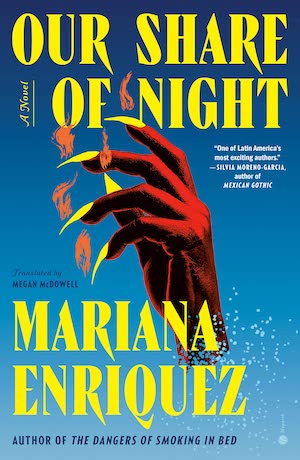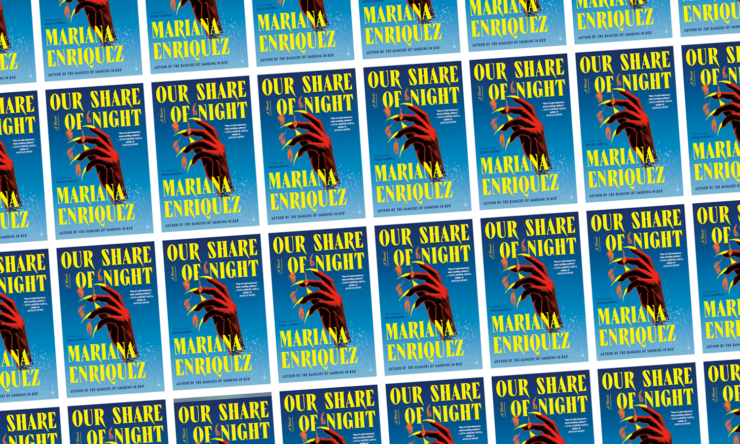It opens with a departure. From the opening pages of her novel Our Share of Night, Mariana Enriquez brings the reader into the visceral lives of her characters, zeroing in initially on a man named Juan who’s pondering the heat outside and taking preventative steps for “the headache he wasn’t feeling yet.” He wakes his young son Gaspar and they set out on a long journey—one that Juan is convinced that they must make. That journey begins in Buenos Aires. The year is 1981.
Depending on your knowledge of Argentine history, that combination of time and place might set off a few alarms.
In 1981, Argentina was still in the midst of the Dirty War, a time of authoritarian violence and political oppression. And while Enriquez and translator Megan McDowell have provided enough context for readers unfamiliar with that history to have a sense of what’s going on—both in the way that the book’s supernatural horrors intersect with some very real-life ones and in some subtler thematic ways.
In time, we’ll learn more about father and son alike, as well as their reasons for fleeing Buenos Aires and the tragedy at the heart of their relationship: the sudden death of Rosario, Juan’s wife and Gaspar’s mother, a few months earlier. Enriquez also reveals that Juan has chronic health problems, and that father and son alike share a kind of supernatural psychic ability. If it sounds like I’m handling some of these things vaguely, that’s intentional—Enriquez opens the book in the middle of a much older story, and eventually provides many more details and much greater context for nearly every aspect of the novel.
Buy the Book


Our Share of Night
Gradually, Enriquez clarifies why Juan and Gaspar are on the run. It has to do with Rosario’s family, who are part of a secret society known as the Order. Their abilities are useful to the Order and their obsession with an eldritch being called the Darkness, which has a penchant to “[devour] fingers and hands”—but to say more would be to spoil one of the novel’s most unsettling slow-burn revelations. The Order are ruthless in their methods, as Juan observes early in the book:
“The Order had never used police or soldiers as sacrifices. Their ideological consistency was impeccable, thought Juan. They only sacrificed people their friends were after, helping them that way. He contributed, but he didn’t feel complicit. He felt innocent. He was a prisoner, too.”
As the years move on, Enriquez follows Gaspar as he becomes a man, and reveals a number of other memorable characters—including Tali, Gaspar’s aunt; Stephen, a morally conflicted ally and occasional paramour of Juan’s; and Olga, an academic who plays a small but key role in the narrative. And while the raw elements of the plot will be familiar to many horror aficionados, Enriquez balances urgency with an immersive sense of place. This is a haunting and thrilling book, but it also knows when to pause for more reflective moments.
One of the most chilling aspects of a book that abounds with them is a relatively understated one—namely, that the Order’s sinister conspiracies go unnoticed in part because of the conflicts taking place across the nation. “Argentina has more than enough anonymous dead,” one character remarks early on. Much later, there’s an unsettling passage involving the discovery of a number of teeth of mysterious origin.
What’s also notable about Our Share of Night are the ways in which Enriquez’s characters engage with real-life works of art and literature. As he grows older, Gaspar alludes to the work of David Wojnarowicz, for instance—and another passage finds another character praising Amos Tutuola’s The Palm-Wine Drinkard and Zora Neale Hurston’s Tell My Horse. It’s not hard to see elements of all three in this novel: Wojnarowicz’s political defiance and struggles with a terminal illness; Hurston’s attentive eye for detail and precise accounting of societal dynamics; and Tutuola’s description of a world where the living and the dead intermingle.
There’s another literary reference in here that’s a bit less overt. A little over halfway through the novel, in one of the two sections that provides abundant context for what’s come before, the narrator of this particular section recalls “[g]oing with Stephen to King’s Road”—and whether this was Enriquez’s intention in the original version or something that emerged in McDowell’s translation, it proved to be a head-turning choice of phrases. On one hand, this is literally embedding the name “Stephen King” into a passage of a decades-spanning work of horror that’s just as concerned with the fraught relationship with a father and a son. And it’s worth pointing out here Enriquez said, “Everything I learned about blending reality and horror, I learned from Stephen King” in a 2022 interview.
On the other hand, for all that Our Share of Night has a King-esque scope, it heads in a very different stylistic direction. The possible nod to King aside, the books that came to mind while reading this were very different: Haruki Murakami’s The Wind-Up Bird Chronicle, for its juxtaposition of real-world atrocities and surreal elements; Charles Palliser’s The Quincunx, another novel about a young man coming of age in the shadow of powerful conspiracies, whose paranoid coming of age has significant repercussions for his later life; and David Peace’s GB84, another novel where conspiracies involving the powerful accumulate an almost horrific element by book’s end.
Except it’s also worth pointing out that Enriquez carves out her own territory here. The individual elements of this book are compelling enough on their own, but the way that Enriquez structures them—sometimes revealing a character’s fate hundreds of pages later, sometimes recounting it in passing—is incredibly rewarding. There was a moment near the end of the novel when one character learned what had happened to another one whom they’d never met directly; the way this was structured both put an earlier section of the novel in an entirely different context but also gave it an additional emotional charge.
Combine that level of detail with some of the most evocative descriptions of unearthly landscapes you’re likely to find and you have a sense of why Our Share of Night resonates as deeply as it does. This isn’t just a novel that blends realism and the horrific—it’s a novel where the two can coexist without any dissonance. The result is an unpredictable novel of epic scope—both in this world and another beyond it.
Our Share of Night is published by Hogarth.
 Tobias Carroll is the managing editor of Vol.1 Brooklyn. He is the author of the short story collection Transitory (Civil Coping Mechanisms) and the novel Reel (Rare Bird Books).
Tobias Carroll is the managing editor of Vol.1 Brooklyn. He is the author of the short story collection Transitory (Civil Coping Mechanisms) and the novel Reel (Rare Bird Books).










